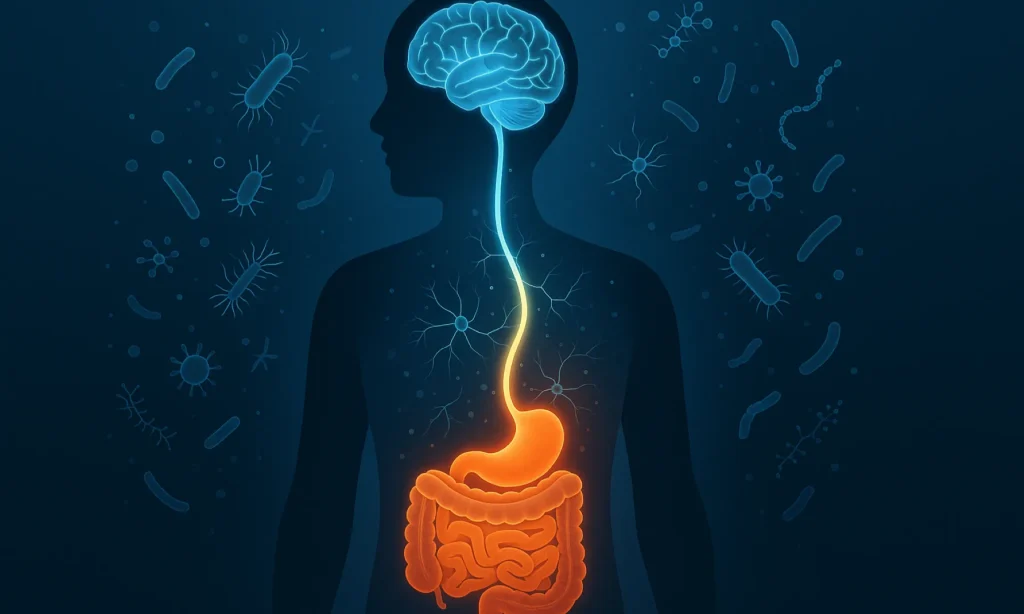Holistic treatment for Tourette Syndrome focuses on managing the condition by addressing the whole person—mind, body, and environment—rather than just the symptoms. This involves natural approaches, such as adjusting one’s diet, practicing mindfulness, and implementing lifestyle changes to identify triggers and promote overall well-being.
These research-based strategies are designed to help not only manage tics but also enable individuals to feel more in control of their condition.
Key Takeaways
-
Holistic treatments for Tourette Syndrome focus on addressing the whole person—mind, body, and environment—rather than just managing tics, offering complementary solutions to traditional methods.
-
Diet plays a crucial role in managing symptoms, with anti-inflammatory diets (e.g., Paleo) and eliminating triggers such as gluten, dairy, and processed sugars showing positive outcomes for many individuals.
-
The gut-brain connection plays a crucial role, as gut imbalances, inflammation, and nutrient deficiencies can significantly impact neurological responses and the severity of tics.
-
Environmental toxins found in plastics, cleaning products, and mold can exacerbate symptoms; reducing exposure to these substances with natural alternatives can help alleviate triggers.
-
Lifestyle factors, such as regular exercise, quality sleep, and stress management through mindfulness or breathing techniques, are essential in creating a calming and supportive environment.
Table of Contents
Uncovering the Root Causes of Tourette Syndrome Through Holistic Lens
Tourette Syndrome is often viewed as an enigma, with its sudden tics feeling like waves crashing in uninvited. But what if those waves aren’t the storm itself, but a ripple from something deeper below the surface? Holistic approaches take a step back to ask, “Why is this happening?” rather than only silencing the tics. Let’s jump into what might be stirring beneath the surface.
1. Understanding the Gut-Brain Connection
Your gut and brain are like best friends constantly texting each other—sometimes sweet, sometimes not so much. An imbalanced gut can send distress signals to the brain, which might contribute to tics. Research has linked conditions like Tourette’s to inflammation and disruptions in the microbiome. If your child experiences frequent tummy troubles or food sensitivities, it may be a sign of a deeper gut issue affecting their neurological responses.
Pro Tip: Incorporate probiotic-rich foods like plain yogurt (with some honey), sauerkraut, or kefir into their diet to create a friendlier gut environment.
2. Spotting Environmental Triggers
Think of your child’s surroundings as a giant radar dish. Subtle environmental cues—like mold exposure, chemical cleaning products, or even heavy metals in drinking water—can act as hidden culprits behind worsened tics. These tic disorder triggers often fly under the radar but create a “perfect storm” when paired with preexisting genetic or physical susceptibilities.
Practical Tip: Consider swapping out harsh chemical cleaners for natural options, and test your home for hidden mold if tics seem to increase unpredictably.
3. Exploring Nutrient Deficiencies
A lack of essential nutrients can make the body more unfit to handle the symptoms of tic disorders. Deficiencies in magnesium, zinc, and specific B vitamins are linked to the severity of tics. These nutrients act like little helpers, calming the nervous system and supporting executive function.
Steady Progress: Sneak leafy greens, nuts, and whole grains into meals—or look into supplements under the guidance of a professional.
4. Exploring Genetic Sensitivities
Genetics doesn’t mean “written in stone”—it’s more like a to-do list for your body. Certain gene variations, like those affecting dopamine and serotonin regulation, might leave your child more prone to tics. While this sounds overwhelming, decoding genetic predispositions can help you fine-tune interventions (like dietary shifts or mindfulness).
Did You Know? Even simple adjustments, such as avoiding processed sugar or artificial dyes, can make a significant difference for sensitive systems.
5. Recognizing Stress as a Catalyst
Stress and emotional dysregulation acts like fuel on the fire when it comes to tics. Whether it’s the pressure of school or tension at home, stress can amplify signs in ways that feel out of control. The key is creating a calm, predictable environment where your child feels safe.
Try This: Incorporate mindfulness into routines—for younger kids, breathing games or yoga can make it fun while still being effective.
By viewing Tourette Syndrome through a holistic lens, you’re not just treating symptoms; you’re addressing the underlying signals the body is sending. It’s not about quick fixes but understanding how these interconnected systems—gut, brain, environment, and beyond—play a role in your child’s health journey.
Debunking Myths: What Everyone Gets Wrong About Tourette Syndrome
Tourette Syndrome often feels shrouded in misunderstanding, kind of like looking at a puzzle with missing pieces. Let’s clear the air and tackle some of the most common myths that might be holding you back from finding the proper support for your child.
Common Misconceptions and the Truth
-
Myth: Medicine is the only effective option. Addressing dietary and nutrient deficiencies, can lead to improvements and, in some cases, even resolve symptoms completely. While medications may help manage tics, they often come with side effects and typically reduce symptoms by less than 50%. Scientific evidence supports the combination of holistic and traditional approaches for improved outcomes.
-
Myth: Tics are random and unavoidable. Tics may appear random, but they often have triggers, such as chemical exposures, hidden allergens, or stress. Identifying and addressing these triggers can reduce their frequency and intensity, much like clearing static from a radio signal to achieve a smoother result.
-
Myth: Holistic treatments are unproven. Holistic treatment for Tourette syndrome utilizes evidence-based methods, including functional lab testing, gut health approaches, and stress management techniques. Additionally, genetic testing can help identify triggers that exacerbate tics. This personalized approach focuses on understanding a child’s unique biology to develop strategies that restore balance, rather than just addressing symptoms.
Biggest Mistakes People Make
-
Waiting too long to act.
-
Expecting quick fixes without addressing the root causes.
-
Overlooking the impact of lifestyle and mental health.

Dr. Piper’s Personal Journey: From Desperation to Symptom-Free Living
Imagine watching your child struggle with overwhelming, uncontrollable tics and feeling powerless with every ticking second. Dr. Piper was in your shoes years ago, exploring a maze of doctor’s visits, medications that didn’t work, and advice that told her to just “ignore it.” But what do you do when ignoring it isn’t an option?
Key Turning Points in Her Son’s Recovery
-
Dr. Piper’s six-year-old son struggled with severe tics, and medications with heavy side effects provided no relief, leaving her feeling hopeless.
-
She turned to a holistic approach, starting with dietary changes—removing gluten, dairy, and soy—which significantly reduced inflammation and improved her son’s condition.
-
Further genetic testing revealed issues with nutrient processing and toxin detoxification. Dr. Piper made lifestyle changes, such as using eco-friendly products and eliminating harmful household chemicals.
-
Over time, her son’s tics disappeared. He regained focus, confidence, and happiness. Now, at 20 years old, he is tic-free and thriving as a firefighter.
This journey didn’t just improve her son; it changed Dr. Piper’s life. She earned a PhD, diving headfirst into natural medicine with certifications in holistic health. Now, she helps families like yours worldwide through personalized plans designed with your child’s unique needs in mind. After all, who better to guide you than someone who’s been there?
The Power of Diet: Natural Remedies for Tourette’s Through Nutrition
When it comes to managing Tourette Syndrome, what ends up on your plate can make a world of difference, like swapping chaos for calm. Food isn’t just fuel; it’s a central player in the gut-brain connection, which can directly influence tics. With a few dietary adjustments, you may discover a key to naturally reducing symptoms.
Dietary Changes That Make a Difference
Eliminate Inflammatory Foods
Inflammatory foods, such as gluten and dairy, can exacerbate tics by triggering gut and brain inflammation. Gluten often contains gut-disrupting chemicals, such as glyphosate, while dairy is known for triggering allergies and digestive issues. Soy, another common allergen, may also disrupt hormones and stress the nervous system. Removing these foods can help reduce “static” in the body and improve overall well-being.
Adopt a Paleo-Style Diet
Focus on clean, whole foods, such as fresh fish, grass-fed meat, eggs, and fruits and vegetables. Avoid ultra-processed, sugary, and preservative-laden snacks. A Paleo-style diet helps reduce inflammation and provides essential nutrients to support a calm nervous system.
Be Aware of Modern Food Additives
Many processed foods today contain harmful additives such as bromine, which affects thyroid function, and folic acid, which some people struggle to process. Avoid ultra-refined grains and prioritize whole foods for long-term health benefits and improved brain function.
Here’s a handy table to cut through the confusion:
|
Trigger Food |
Why It Harms |
Holistic Alternative |
|---|---|---|
|
Gluten (wheat) |
Causes brain inflammation and anxiety |
Almond flour or grain-free flours |
|
Dairy |
Triggers allergies, digestive issues |
Almond or coconut-based milk |
|
Processed sugars |
Spikes inflammation, amplifies tics |
Fresh fruits for natural sweetness |
|
Soy |
Disrupts hormones, worsens sensitivities |
Chickpeas or lentils for protein |
Dr. Piper shares her experience of managing her son’s Tourette syndrome through gradual dietary changes, like replacing sugary cereals with eggs and berries or swapping dairy yogurt for coconut yogurt. Although imperfect at first, these adjustments led to noticeable improvements in focus, mood, and a reduction in tics. The key is taking a long-term, steady approach to building a healthier foundation.

Exploring the Gut-Brain Connection and Tics
They say your gut is your second brain—and when it’s out of whack, your brain might feel the effects in surprising ways. For kids with Tourette Syndrome or tics, those ripples can turn into waves, influencing everything from motor tics to anxiety. Let’s jump into how the gut-brain connection plays a starring role in managing tics.
How Gut Imbalances Fuel Tics
Gut health is quite important for individuals with Tourette syndrome. Ingesting certain foods can trigger brain inflammation that makes tics and anxiety much worse. Avoiding gluten and similar inflammatory foods is a must—people on the cusp of Tourette syndrome should avoid these as well. High-stress situations can make tic disorders much worse; it’s possible that they might not be disorders but rather a way for the nervous system to cope with excessive stress. I’ve also read that some researchers now classify Tourette syndrome and tic disorders as forms of anxiety.
Nutrient absorption might be a major reason why some people develop these disorders in the first place. If you’re not absorbing the nutrients that your brain and nervous system need to be healthy, they’re not going to be healthy, and you’re going to get these facial and upper-body tics.
Testing and Solutions
Assessing dysfunctions in the gut-brain connection can shed light on Tourette Syndrome. Testing can identify gut issues such as parasites or imbalances. It can also uncover sensitivities or intolerances that might affect the severity or frequency of tics, as in the case of histamine intolerance. Enzyme supplementation (with a DAO enzyme, for example) has been said to help those with Tourette’s manage their condition by complementing a low-histamine diet.
Alterations in dietary habits, such as following anti-inflammatory dietary plans (e.g., Paleo or GAPS), and eliminating processed foods, gluten, dairy, and sugar can foster gut health. Increased gut health can potentially foster healthy behavior and reduce tics over time. Gut health is critical to the next generation, especially in children who are aging (8-26). As kids grow, their nutrient and dietary needs change, affecting their gut microbiome.
Starting with testing and gradual adjustments can lead to meaningful improvements. Each step builds toward better holistic health and managing tics effectively.
Genetic Testing: An Unconventional Roadmap to Manage Tourette’s Without Medication
Genetic analyses can lift the veil on some of the concealed factors that influence TS, such as how a child processes inflammation or how well they detoxify or absorb certain key nutrients. The genes that are most likely involved may be tied to detoxification challenges, nutrient deficiencies, and/or sensitivities to certain foods. Heeding the information these tests provide, parents can make some very specific changes to the environments their children live in, like switching to non-toxic cleaning supplies; and the tests serve as a basis for some important dietary changes, too, as well as a regimen of some key nutrients that the kids were missing.
Eliminating Environmental Toxins: Hidden Culprits in Tourette Syndrome
Sometimes the most overlooked parts of your daily life can have the biggest impact on your child’s tics. Environmental toxins—hidden in everyday items like plastics, cleaning supplies, or even the air—can make Tourette Syndrome signs worse. These sneaky culprits disrupt the body’s natural detoxification process and amplify sensitivities.
Toxin Sources and Impacts
Plastics used for food and drinks often contain harmful chemicals like BPA and phthalates that can disrupt hormones. Switching to stainless steel or glass containers is a simple way to reduce exposure. Similarly, many cleaning products release VOCs that can hinder the body’s detox process. Opting for natural cleaners like vinegar or baking soda is a healthier alternative. Mold is another issue, as it can increase histamine levels and inflammation, worsening tics. If your home smells musty, using a mold test kit can help identify and address the problem.
Step-by-Step Refresh Strategies
When it comes to detoxing your home, you don’t need to redo everything overnight. Small, mindful shifts can add up to major changes for your family’s health.
Start with an audit. Open your cabinets and take a look—what’s in your laundry detergent, dish soap, or air fresheners? If you see ingredients you can’t pronounce, you’re probably dealing with unnecessary chemicals. Replace them with products labeled non-toxic or free of synthetic fragrances. Pro tip: Look for plant-based cleaners! They’re kinder not only on your surfaces but also on your kiddo’s system.
Go gradual. Let’s face it, overhauling your home in one go is expensive (and overwhelming). Instead, focus on high-contact areas like the kitchen or bathroom first. Maybe replace that scratched-up plastic cutting board with a bamboo one or phase out that chemical-heavy room spray. Keep an eye out for sales or coupons—slow changes don’t have to expensive.
Check outdoor exposures. If your child spends time near areas with strong cleaning chemical usage—like school janitorial closets or office spaces you frequent—try to advocate for less toxic options. Perhaps your workplace could move cleaning supplies to a lower-traffic area or use unscented cleaners. Small adjustments can mean fewer irritants in your family’s breathing space.
Making these changes isn’t just for show—it can bring real results. Dr. Piper saw a dramatic improvement after removing home toxins, with reductions in both her anxiety and her son’s tics. By taking small, steady steps, you can design a cleaner, calmer environment that supports your child’s well-being. And hey, making a toxin-free home feels pretty empowering too, doesn’t it?

Lifestyle Factors: Exercise, Sleep, and Stress Reduction for Holistic Balance
When it comes to managing Tourette’s Syndrome, the basics are more impactful than you’d think. Exercise, sleep, and stress aren’t just buzzwords—they’re the cornerstone of creating a calm and balanced environment for your child. Let’s jump into a few lifestyle tweaks that can make a big difference.
Essential Lifestyle Adjustments
Sleep and Rest: Prioritizing sleep isn’t just about bedtime routines; it’s about understanding how rest keeps your child’s system balanced. Poor sleep can amplify tics, often because unaddressed inflammation or anxiety tricks the body into overdrive. Think of sleep as the reset button—track their evening habits and even experiment with earlier bedtimes or calming rituals like reading or listening to soft music. Noticing restless nights? It could be a cue to dig deeper into any imbalances causing disruptions.
Exercise: Movement isn’t optional—it’s essential for managing tics. Regular physical activity not only boosts mood and burns off anxious energy but also helps the body better use nutrients by keeping blood flow steady and the brain active. If treadmill time feels too formal for kids, try playful options like a backyard soccer game or dance-offs in the living room. Remember, it doesn’t have to be perfect—a quick run at the park or climbing the jungle gym counts too!
Stress Management: Childhood isn’t always carefree—stress can sneak in and wreak havoc on their little nervous systems. Helping your child manage stress naturally could mean introducing mindfulness through simple breathing exercises (Bubble breathing, anyone?) or just slowing things down when the day feels too full. And don’t forget to get proactive: teaching kids to tune into their bodies and label “worry times” can help unravel those stress knots before they tighten.
Parents, here’s a small truth bomb—early habits matter. If you can nurture a love for whole foods and outdoor play now, you’re reducing the chances of those screen-heavy, takeout-filled routines taking over later.
Navigating Research and Professional Help: Becoming Your Own Advocate
Feeling overwhelmed by all the information out there about tics and Tourette Syndrome? You’re not alone. Becoming your child’s advocate doesn’t mean having all the answers right away—it’s about asking the right questions, taking your time, and digging deeper than the surface.
How to Research Effectively
Research isn’t just about Googling signs or scrolling through social media posts (although we’ve all been there at 2 a.m., haven’t we?). It’s about peeling back the layers. Here’s how to approach it like a pro:
-
Read the full story, not just the headline. Relying on snippets or sensationalized articles can leave you with more confusion than clarity. Always check the source—who’s funding the study? For instance, pharmaceutical companies sometimes back research that leans toward promoting certain medications. Make it a habit to look for the fine print or disclosures.
-
Ask better questions. When meeting with doctors, don’t shy away from asking about things like nutrition, sleep, or environmental triggers. You might be surprised to learn that traditional medical training in the U.S. includes minimal (we’re talking fewer than 25 hours) nutrition education. That’s why digging into diet or lifestyle adjustments often falls to us as parents. Ask, “Could foods like gluten or dairy be affecting my child’s tics? Could improving sleep make a difference?” Questions like these open up new paths to explore.
-
Jump into the world of side effects. Some medications for tics can unintentionally cause additional problems, like increased involuntary movements (yep, the thing you’re trying to fix). It’s worth reading up on everything before committing. Not sure where to start? Use reputable sites like PubMed or ClinicalTrials.gov for peer-reviewed studies rather than relying on anecdotal evidence.
-
Find your people. Sometimes you need more than Google—you need a guide. Holistic practitioners, naturopathic doctors, and functional medicine experts can be game-changers. These professionals specialize in looking at the whole picture, from nutrient imbalances to genetic sensitivities. Teaming up with someone knowledgeable about Tic disorders or PANS/PANDAS could help you uncover what’s really going on beneath the surface.

Empowering Next Steps: Building Your Holistic Plan for Tourette Syndrome
A holistic approach to Tourette Syndrome looks at what causes it to better understand how to cure it. This involves studying the gut, nutrients, and the environment because changes in any of these might affect the brain in ways that result in tics.
Determining what has changed in any of these areas for a particular individual might provide valuable information for that individual, and for the next person, and the next. Trying to understand TS in a more personal and localized way might provide the impetus for finding better and more widespread cures.
If you are ready to dig deeper into your child’s tic disorder, click here and start with the Tic Disorder Cheat Sheet.
Frequently Asked Questions
Tourette Syndrome is a neurological disorder characterized by repetitive, involuntary movements and vocalizations called tics. These tics can vary in type and severity over time.
Yes, dietary changes can support managing Tourette’s Syndrome. Eliminating inflammatory foods like gluten, dairy, and soy while adopting a whole-foods diet, such as Paleo, may help reduce tics by improving gut health and overall well-being.
Gut health affects the brain through the gut-brain connection. Imbalances in gut bacteria or conditions like “leaky gut” can exacerbate tics and anxiety. Supporting gut health through diet and testing for sensitivities can help manage symptoms.
Environmental toxins like mold, chemicals, and plastics can disrupt the body’s detoxification process, worsening tics. Reducing exposure to these toxins by using non-toxic products and cleaning solutions can create a healthier environment.
Genetic testing helps identify unique genetic factors, such as nutrient deficiencies or sensitivities, that can contribute to inflammation and tics. This knowledge allows for tailored dietary and lifestyle interventions to support the child.
Mindfulness and stress reduction techniques, such as deep breathing and relaxation exercises, can reduce anxiety and activate the nervous system’s calming response, helping to lower the frequency and intensity of tics.
Medications can help reduce tics but often come with side effects and may not address the underlying causes. A holistic approach, focusing on diet, lifestyle, and environmental factors, may offer more sustainable improvements.
The Paleo diet focuses on unprocessed, whole foods like meats, vegetables, fruits, and healthy fats. This anti-inflammatory diet supports gut health and may help reduce tics associated with Tourette Syndrome.
Parents can begin by gradually eliminating inflammatory foods like gluten and dairy while introducing whole, nutrient-dense options. Small, manageable changes over time can ease the transition to a healthier diet.
Regular exercise boosts mood, enhances nutrient absorption, and reduces stress, while prioritizing quality sleep supports nervous system regulation, both of which can help manage tics and improve overall well-being.
Parents can reduce stress by creating a structured routine, ensuring adequate sleep, and fostering open communication. Minimizing environmental toxin exposure and practicing mindfulness techniques can also promote calmness.
Holistic approaches focus on addressing root causes like diet, environment, and stress, while traditional treatments often focus solely on symptom relief through medication. A combined approach may provide more comprehensive benefits.
Parents should research holistic practitioners who specialize in nutrition, genetics, and environmental health. Asking questions about personalized care and potential side effects of interventions can ensure that their child receives a tailored and effective plan.

